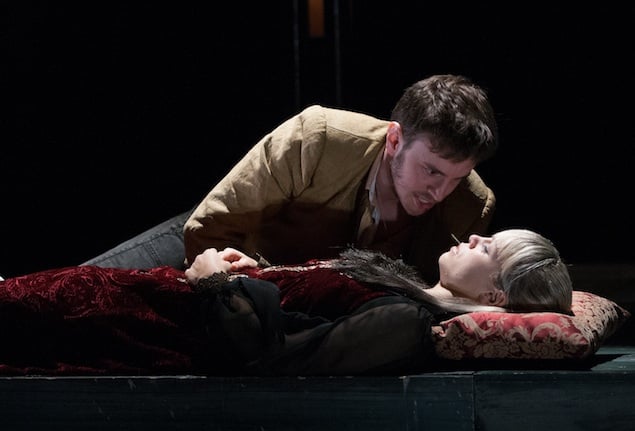
In Aaron Posner’s visceral but inconsistent production of Romeo and Juliet, currently playing at the Folger through December 1, one odd design choice becomes apparent the moment the show begins. Juliet (Erin Weaver) is seated atop a balcony above the stage next to an oblivious Romeo (Michael Goldsmith), wearing a woolly hat and glasses and fixedly studying a book (imagine an older and less sarcastic Alex Dunphy). In later scenes, she’s dressed like a ’90s-era grunge devotee in lacy petticoats and Doc Martens with long ombré hair extensions. And yet this isn’t yet another modern-day Shakespeare—everyone else is in brocade gowns or some such period attire (the costumes are by Laree Lentz), which leaves you wondering for a good portion of the first half why exactly this might be.
Posner seems to be hinting at contemporary tragedies such as Columbine by reinventing Juliet as a goth-tinged teenager, and in the program he draws parallels between the headstrong starcross’d lovers and the “senseless violence” that kills thousands of Americans every day. (In a heartbreaking note he dedicates the production to the memory of Michael Wells Arnold, the father of a Folger assistant stage manager who was killed in the Navy Yard shootings just over a month ago.) It’s something of a stretch to imply that thoughtful, grounded, obedient Juliet might be akin to a tortured Marilyn Manson fan, but the characterization comes together in the second half of the play when Weaver’s Juliet practically implodes with rage after Romeo’s exile.
One of the strongest elements of the show comes from Posner’s interpretation of Lord Capulet (Brian Dysktra) as an alcoholic and a vicious abuser; one of the weakest is Romeo himself, who, far from being a lovelorn, sensitive soul is the kind of cocky, immature kid whose shockingly bad poetry you’d dispose of immediately should you find it in your daughter’s backpack. His affection feels insincere whether it’s directed at Juliet or the swiftly forgotten Rosaline, and as a result it’s hard to feel anything for history’s most iconic lovers beyond wishing they’d take a deep breath and slow down a bit, figuratively speaking.
Hilton Als of the New Yorker has written about how film adaptations of Romeo and Juliet have ruined the pacing of the play for many audience members—the pair fall in love and marry in what seems like a heartbeat, followed by an interminable wait in the last two acts for their inevitable demise. Posner’s pacing prolongs the second half of the show even further, drawing out some tedious interplay between Friar Lawrence (a fantastic Eric Hissom, who does triple duty as the Prince and the Apothecary) and Paris (Joe Mallon), although the scene in which Juliet’s body is placed reverently on the stage and draped in a veil is somber and very moving.
The production’s most powerful scene occurs when Juliet tells her father she won’t marry Paris, prompting him to fly off the handle and attack his daughter, her nurse (Sherri Edelen, who plays the role in an understated way that’s very effective), and, most viciously of all, his wife (Shannon Koob). Dysktra is terrifying, and the women are rightly hysterical—it’s a raw scene that adds a lot to the text without coming across as forced. In contrast, a wordless scene in which Posner shows Romeo’s mother (Michele Osherow) tipping pills into her wine before joining a group of ghosts above the stage feels unnecessary.
The production is strengthened by forceful performances from Brad Koed as Mercutio and Rex Daugherty as Tybalt, the latter of whom bears much of the responsibility for the violence that pervades the play. Still, given the show’s nods at contemporary culture, it might have been rewarding to see Tybalt as more of a violent bully who gets his kicks tormenting others as opposed to a poised nobleman ostensibly defending his family’s honor. The set, too, feels like a missed opportunity—designer Meghan Raham has crafted a minimal blue-green structure of ramparts and ladders with images framed and backlit from inside, but it’s hard as an audience member to tell exactly what those images are. (One looks like a 19th-century photograph of a town, others like abstract paintings.)
An original score by Carla Kihlstedt accompanies the action, amping the drama, horror-movie style, by punctuating important moments and underlining the pathos of the last two acts. If the love affair between the aggressively childlike, teddy-bear-clutching Juliet and the swaggering, inconstant Romeo felt more like fate and less like a tween crush, this dark, expressive Romeo and Juliet might linger as immensely powerful instead of oddly uneven.
Romeo and Juliet is at the Folger Theatre through December 1. Running time is about two and a half hours, with one intermission. Tickets ($30 to $72) are available via Folger’s website.

















